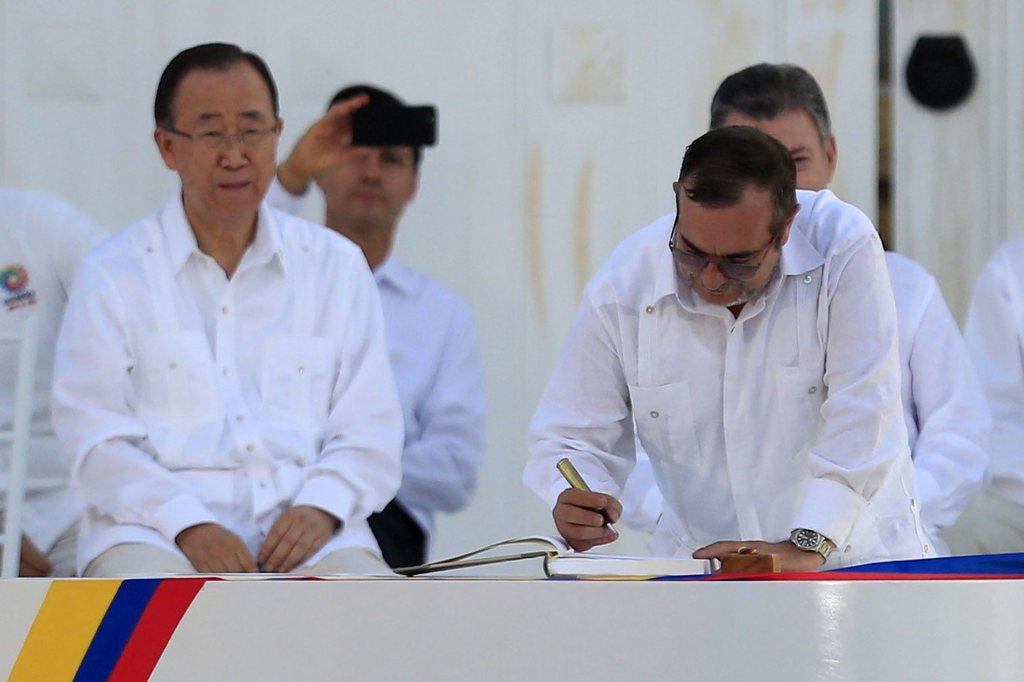
Transitional justice officials hold Geneva hearings with exiled Colombians

Colombian victims of human rights abuses committed during the five-decade war who have been exiled to Europe shared their testimonies in unique hearings in Geneva this week.
“Sixteen victims from six European countries [Switzerland, Spain, Sweden, Norway, Belgium and Portugal] have come here to Geneva to give us their voice, time and effort, despite the fact that they have been very badly treated by judicial institutions over many decades,” Catalina Diaz, a judge for Colombia’s Special Jurisdiction for Peace (JEP) tribunal, told reporters in Geneva on Thursday.
She was part of a team of Colombian officials on a joint mission to Europe, alongside experts from Colombia’s Truth Commission, who auditioned exiled victims of the war, which pitted leftist rebels against government forces and right-wing paramilitary groups.
A 2016 peace accordExternal link between the government and Revolutionary Armed Forces of Colombia (FARC) rebels established the JEP to investigate, judge and hand out sentences for the most serious war crimes. It also created the Truth Commission to examine why the conflict happened, the atrocities committed and how future bloodshed can be avoided, and a Unit for the Search for Missing People.
The accord remains controversial in Colombia, where some feel the rebels got off easy. Former combatants who fully confess to any crimes they committed during the conflict will avoid jail time.
The Geneva-based World Organisation against Torture (OMCT)External link, which helped coordinate the Swiss-government funded mission to Geneva, described the hearings as an “unprecedented attempt at involving the diaspora in a truth and accountability process following an internal armed conflict”.
“I think you have been writing history here in Geneva,” said OMCT Secretary General Gerald Staberock. “I have to applaud you for taking the hearing here to find truth and justice for the people in exile in Europe. I have not seen this in other truth commissions, and I think it’s rather exceptional and unique.”
The team has already completed similar hearings in Canada and is due to travel to Argentina at the end of November.
Unión Patriótica
Catalina Diaz said the JEP tribunal had already opened seven big cases, which covered the kidnappings of civilians by FARC, extrajudicial killings by military forces, child recruitment by FARC and the extermination of parliamentarians and supporters of Unión PatrióticaExternal link, a left-wing political party that became successful in the mid-1980s. Later, some 2,000-5,000 people linked to the party were targeted and killed, disappeared and forced into exile.
The hearings in Europe focused on exiled Colombians who had been victims of the bloody repression suffered by Unión PatrióticaExternal link.
“I never thought I would have the right to express myself,” said Andres Perez Berrio, 59, who was forced into exile in Geneva in 1995.
After joining Unión PatrióticaExternal link in the 1980s, the farmer became the mayor of his village located in northwest Colombia near the border with Panama. Arrested, detained and tortured by the army, he was forced to seek exile in Switzerland with his wife, children and his brother.
Berrio said his testimony in Geneva had lasted three hours, during which he had cried several times in front of the judges and commissioners when describing the acts he had suffered. He was able to return to Colombia for the first time in about 20 years but believes there are currently no “guarantees” of normality in the country of his birth.
Colombia’s five-decade war resulted in 200,000 people killed, 7.7 million displaced and 60,000 listed as missing, according to government figures. Around 500,000 were forced into exile.
The Colombian diaspora in Switzerland comprises at least 4,900 citizens who were registered as legal residents in 2018.

More
Colombian peace deal deposited in Bern

In compliance with the JTI standards
More: SWI swissinfo.ch certified by the Journalism Trust Initiative






























You can find an overview of ongoing debates with our journalists here . Please join us!
If you want to start a conversation about a topic raised in this article or want to report factual errors, email us at english@swissinfo.ch.